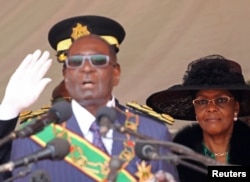As Angola’s notoriously media-shy president prepares to step down after nearly four decades in power, all eyes in this southern African nation are looking not at Jose Eduardo dos Santos — but at his billionaire daughter.
In recent months, Isabel dos Santos has taken over a major bank and embarked on restructuring the state-owned oil company. These moves have raised criticisms that dos Santos, ranked by Forbes magazine as Africa’s richest woman, is trying to further her family’s wealth at the expense of Angola’s people.
Though flush with oil, Angola is one of the most unequal societies in the world, a point that dos Santos’ critics frequently raise.
"She’s stealing from the state," said Rafael Marques, a prominent journalist and anti-corruption campaigner who is one of dos Santos’ fiercest critics — and he sued her in a Portuguese court after charging that she launched a public smear campaign over his critical reporting on her business empire.
“It’s plundering the state," Marques continued, speaking to VOA from Portugal. “And it does not improve the lot of Angolans. It basically impoverishes the country father, because this is money that should have been applied in other projects for the benefit of the country, and not one person. And in that, she counts on the highest office in the country for her personal gain. That is not cool. That is not acceptable.”
Dos Santos has previously accused her critics of playing political games, and says she came by her immense wealth through hard work and professional competence. Watchdog Transparency International, however, has ranked her among the world’s 15 most corrupt people and institutions — putting her in the company of the international soccer (football) governing body, FIFA.
Alex Vines of research institution Chatham House said there is some merit to her argument. “She has, to give her credit, embarked on some very serious reforms of the state oil company Sonangol,” he said.
“She has confronted some serious vested interests," he said. "Some of the media frenzy about her in recent weeks is, I think, partly a backlash to that. So the Angolan oil industry desperately needs reform to be modernized and bring down the costs. And she’s an effective business lady, whatever you think about her having got the job because possibly she is the president’s daughter, there is an effectiveness in the reform process that you have to give her credit for.”
Repeated calls to the media department of Sonangol for comment on this issue went unanswered. The oil company’s website is flush with examples of how the company has reached out to the community with new roads, clinics and housing developments.
Other African leaders have appointed children and close relatives to top positions in government, raising speculation that they’re being groomed to take over. This has been seen most recently in Uganda, where the president named his son — a 42-year-old two-star general — to be special presidential adviser.
In Zimbabwe, the 92-year-old president’s wife is rumored to be planning to take the reins after his death. And in Equatorial Guinea, Africa’s longest-serving president has made his choice of successor explicitly clear by naming one of his sons as vice president.
Vines said this future is not likely — or even possible — for Isabel dos Santos, who was born to the president's Russian-born first wife in what is now modern-day Azerbaijan.
“There has been, over the last couple of years, frenzied speculation that her father is grooming her to become president of Angola,” he said. “But that speculation has been a bit political and a bit naive, for two reasons. Firstly, Isabel dos Santos was born outside of Angola. Constitutionally in Angola, you can only run for president if you’re born in the country. Secondly, race politics plays a role in Angola. The [ruling Popular Movement for the Liberation of Angola] has a history of drawing from black Angolans for its presidency. And that politics is still very much alive and well in Angola.”
Instead, both Vines and Marques agree, dos Santos' current industriousness is part of a plan to provide for her family in a post-presidential era. Another sign of this is that President dos Santos also appointed one of his sons to chair the nation’s Sovereign Wealth Fund, worth an estimated $5 billion dollars.
Marques said he hopes the multiple allegations of corruption and nepotism will catch up with the family, which will leave them few choices after the president’s term ends.
“Once her father steps down, she will run away,” he said. “That’s what will happen to Isabel. She will run away. She will not stay in the country to face prosecution.”
An August vote, no doubt, will be a turning point as Angola picks its first new leader in 38 years. Those familiar with this troubled southern African nation, though, say the fate of the first family will be just as interesting — and possibly, no less dramatic.






